
Following is an excerpt taken from my book, The Strong Delusion: Revealing the Strange God of the Antichrist, (https://TheStrongDelusion.net)
The equation of “God = love” cuts through the religious red tape. This scripture means to me, as an extreme example, that if a Muslim honestly believes what 1 John 4:7-8 says about love, then I would be inclined to consider the possibility that that Muslim could actually be saved by faith in the knowledge of who God actually is; the incarnation of love.
Having a genuine relationship with God is more than an intellectual body of knowledge; it’s more than the syntax and pronunciation of a certain name in a certain language; it’s more than semantics. It’s love.
Now I can hear Christians rattling off 2 Peter 3:16 and other scriptures, telling me I’m way off base here, with my suggestion that Muslims can be saved without converting to Christianity. That’s not what I’m saying. Jesus gave us the Great Commission for a reason; to spread the knowledge of Him throughout the Earth. That’s very important! However, what I am referring to here is the raw essence of the heart that God judges people on; the stuff He’s looking for when He evaluates a soul.
God is looking for love, which is revealed in various ways, (selflessness, sacrifice – which isn’t suicide-bombing), repentance, caring for others, etc. Those who have love in their hearts, respond to the Holy Spirit when He comes knocking.
For those who have not yet accepted Christ, but they have all the right ingredients in their hearts; I call them pre-Christians, (though most Muslims would most likely reject to being called pre-Christians). However, an open face to face conversation with Jesus would probably clear things up in short order, (which is actually happening all over the Middle East with Muslims right now, and they end up becoming Christians). Seeing Jesus face to face can open the eyes of pre-Christians, and ironically, so can seeing the works of the devil.
Consider a Voice of the Martyrs article titled, “The Islamic State drove me to Christ.” In it, Pastor Joseph in Iraq reports seeing large numbers of Muslim youth in Iraq, leaving Islam after learning how the Qur’an inspired ISIS and its slaughter of Christians.

Read 1 John 4:7-8 again; these young Muslims have true love in their hearts, therefore, they are born of God, even though all of their lives, they were professing Muslims. Seeing the slaughter of fellow human beings has torn into their hearts to such an extent, that it opened their eyes to Jesus. They were taught before they could even talk, by their parents, siblings, relatives, friends, neighbors, town clerics, television; their entire world, to venerate the Qur’an with unyielding, unquestioned adoration. They cannot even say Muhammad’s name, without the suffix of ‘peace be upon him.’ Yet, in the face of all that unrelenting indoctrination, they tossed the Qur’an in the trash when they finally realized that it was not consistent with a heart of love. These people actually knew God, even though they were Muslims.
1 John 4:7-8 [bold emphasis added]
Beloved, let us love one another: for love is of God; and every one that loves is born of God, and knows God. He that loves not knows not God; for God is love.
“I was a Muslim, and now I am seeing,” one former Muslim reported to Pastor Joseph, after studying the Qur’an in depth. This began when ISIS arrived in his home town of Mosul. He constantly found himself declaring, “This is not Islam!” God gave this man a starting point, but it needed a minor modification. He would have been more accurate to say, “This is not me! What you people are doing, is wrong!”
Realizing his declaration, “This is not Islam!” had little substance to back it up, he set out to prove, using the Qur’an, that ISIS was not following true Islam. As he studied the Qur’an for hours on end, he eventually discovered that ISIS was, in fact, following an extreme version of true Islam, and it was he who was at odds with it.
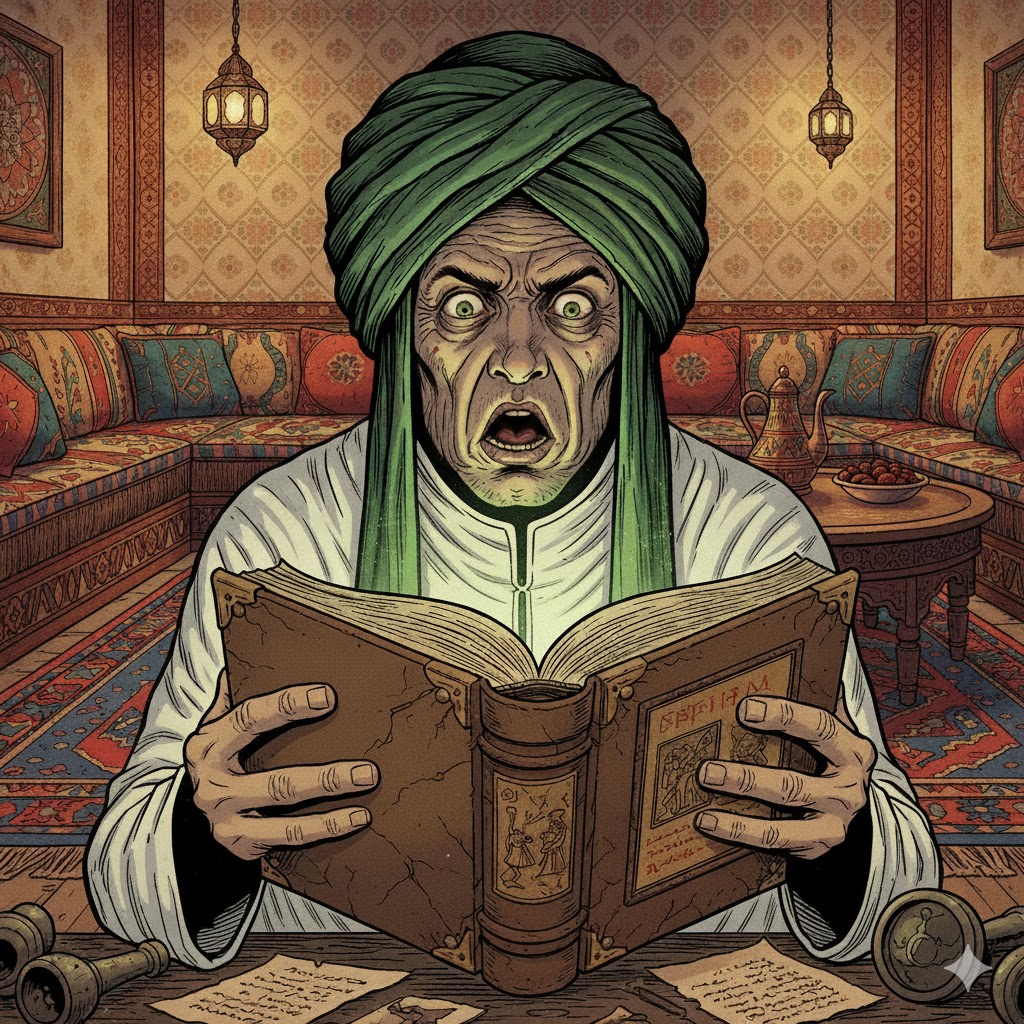
Pastor Joseph described yet another man who was shocked at discovering just how precisely the Qur’an had inspired ISIS. Upon this discovery, he became an atheist. This empty state of being did not last very long, however.
Days later, he happened upon a group of men sitting around a table outside a library. They must have been bold Christians, because there were Bibles and Christian literature on the table out in the open, in spite of everything going on in the area with ISIS. When he asked the men for a Bible, they readily gave him one, and he proceeded to read it. The following account is what happened next:
After receiving a New Testament, he returned home and began reading. The story of the woman caught in adultery in John 8 captured his attention, particularly the part in which the crowd asked Jesus, “What should we do with this lady?”
“Would I stone her?” The man asked himself.
He then read Jesus’ response: “He who is without sin among you, let him throw a stone at her first.”
“This is God!” the man shouted in his home. “This is the real God we should worship!”
I believe this man knew who the real God of love is, before ISIS ever came to town. He was just mixed up about His name. It took the arrival of ISIS to open his eyes to the fact that the real God, is not the Allah of ISIS, or the Allah of the Qur’an. The real God shows love and compassion, to defend a guilty, hopeless, humiliated, broken woman, who has no one to turn to, and nothing to offer. The real God will do absolutely anything to reach us, and teach us about the love He has for us, even if it means getting nailed to a cross to do it.
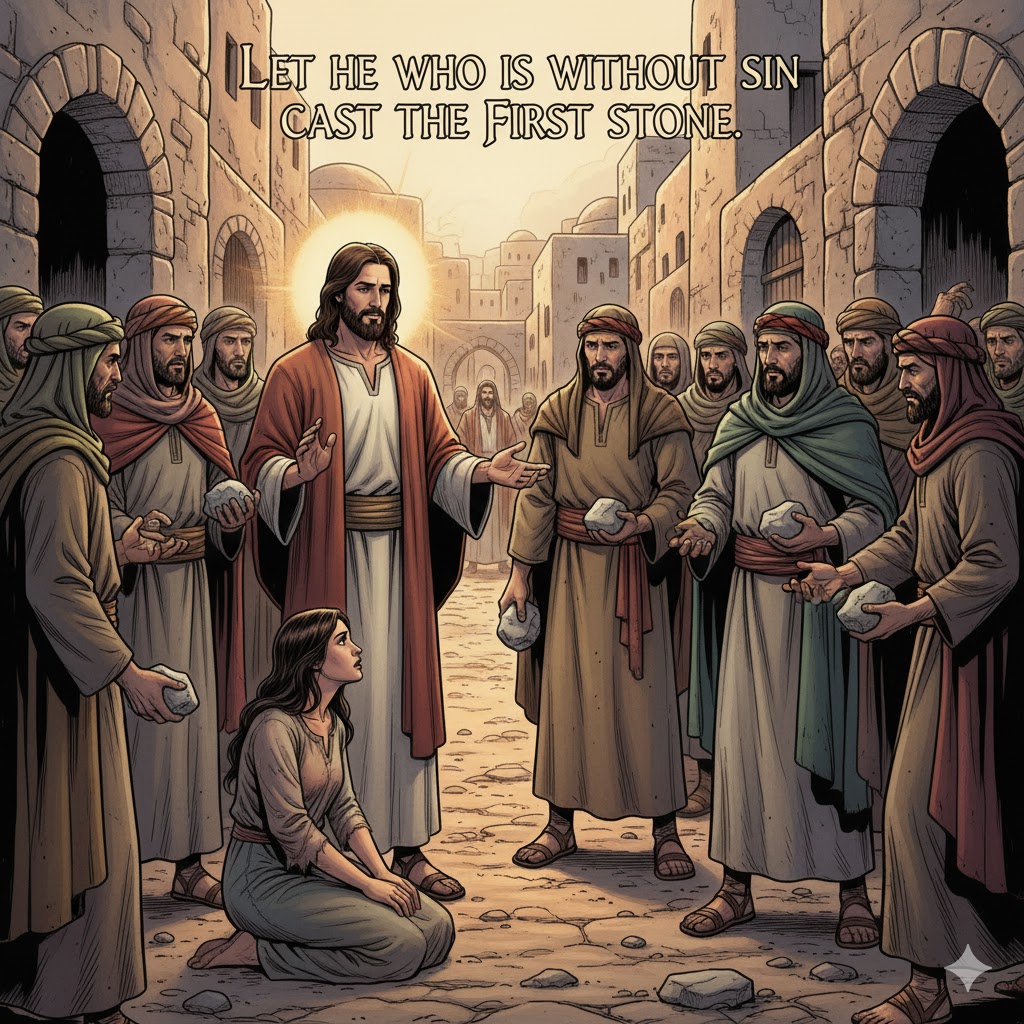
If we hope for a God of selfish desires, of hatred, control and violence, and overwhelming pride that cannot tolerate even the slightest insult—or if we hope for a push-button God who says yes to all our prayers without question; or a God who does not care what we do; then it is we who have no interest in Him for who He really is. God will gently knock on the door of our hearts all of our lives, sometimes pleading to come in, but many will refuse to let Him in, and never discover Him for the eternally selfless, loving Being He truly is.
If we shut out God’s love in our innermost beings, we will eventually listen to other voices. That’s when people go beyond the point of basic selfishness and living in the flesh, and into the realm of the demonic.
However, if we hope that God exists, and that He is good; that He is loving and forgiving, kind and full of grace, and we seek Him out with that kind of hope in our hearts, it’s only a matter of time before we will start hearing His voice. It is this hope, combined with love that spurs the Holy Spirit to produce faith within us. Again, the key is what’s in our hearts, (Psalms 44:21, 64:6, 139:23-24; Jeremiah 17:10), that determines what we hope for, more so than anything else.
So now that that is out of the way, I hope I have left enough room for any Muslims reading this, to give me the benefit of the doubt that I do not hate them. I think there might even be Muslims that die while in their definition of being devout Muslims, and they still go to heaven because of the genuine truth about love that they have in their hearts, which transcends the vocalizations of any given language, and will enable them to see Jesus as God when they meet Him.
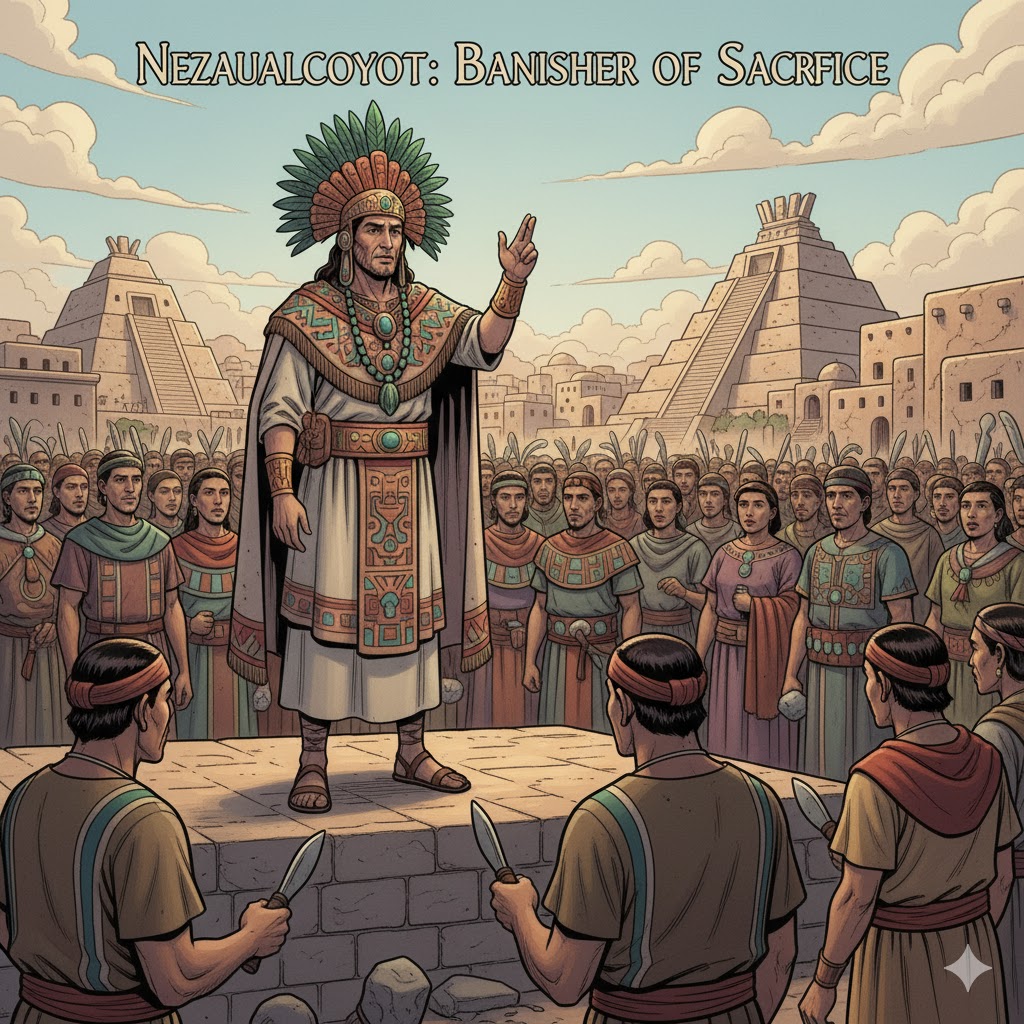
An example of what I’m talking about might include a sheltered Muslim woman who has a heart of gold. Because of her circumstances, she might never hear the Gospel, or at least hear it accurately, and because of this, I would consider her as someone saved by faith, just as the righteous people in Old Testament times were saved by faith, (Hebrews 11). Another example of this might be the South American king known as Nezahualcoyotl, (1402−1472). His name meant “Hungry Coyote.” Even though he was born into a pagan culture that sacrificed their children, he knew in his innermost being, that this was not right. He also knew that there was something inherently wrong with their idolatry, even though he was never exposed to the Gospel.
As a poet and ruler in Mexico before the arrival of the Europeans, he [King Nezahualcoyotl] wrote, “Truly the gods, which I worship, are idols of stone that do not speak nor feel…Some very powerful, hidden and unknown god is the creator of the universe. He is the only one that can console me in my affliction and help me in such anguish as my heart feels; I want him to be my helper and protection.” … During the reign of this king, he built a pyramid to the “God who paints things with beauty,” and he banned human sacrifices in his city.
Though this South American king had never heard the Gospel, he nearly quoted the Apostle Paul when he gave his sermon on the unknown God while in Athens, (Acts 17:16-34).
I know Jesus said He is the Way, the Truth, and the Life and that no one goes to the Father except through Him, (John 14:6; Matthew 18:3). And I believe that ultimately there will come a point in everyone’s existence, when there will be a line drawn for people to accept Jesus. Most people think that line is death, but I personally think it might possibly be a little bit after that, because of what I’m talking about here. God transcends time, so the concepts of before or after are somewhat mute when it comes to God. He might have ways of working around what we conceive of as unmovable barriers or limits that defy our imaginations.
I’ve read about, and viewed many testimonies on YouTube, where people have actually died and went to hell, yet when they called out to Jesus in that hopeless situation, Jesus arrived and resurrected them from the dead. Now I certainly do not recommend to anyone to test this theory out! Choose Jesus now while you still have the breath of life, for crying out loud! I’m only basing this theory about God’s grace extending for a brief period after death on some research I conducted. This research is by no means concluded, nor do I consider it definitive or even authoritative. It is only a contemplation.
Consider this question: after we die, where do we go?
Concerning those who are saved, the Apostle Paul states in 2 Corinthians 5:8, that being absent from the body will place him into the presence of the Lord. What he does not detail for us, however, is whether or not this is an instantaneous transfer of consciousness.
2 Corinthians 5:8
We are confident, I say, and willing rather to be absent from the body, and to be present with the Lord.
As for those who are not saved, they have a different fate.
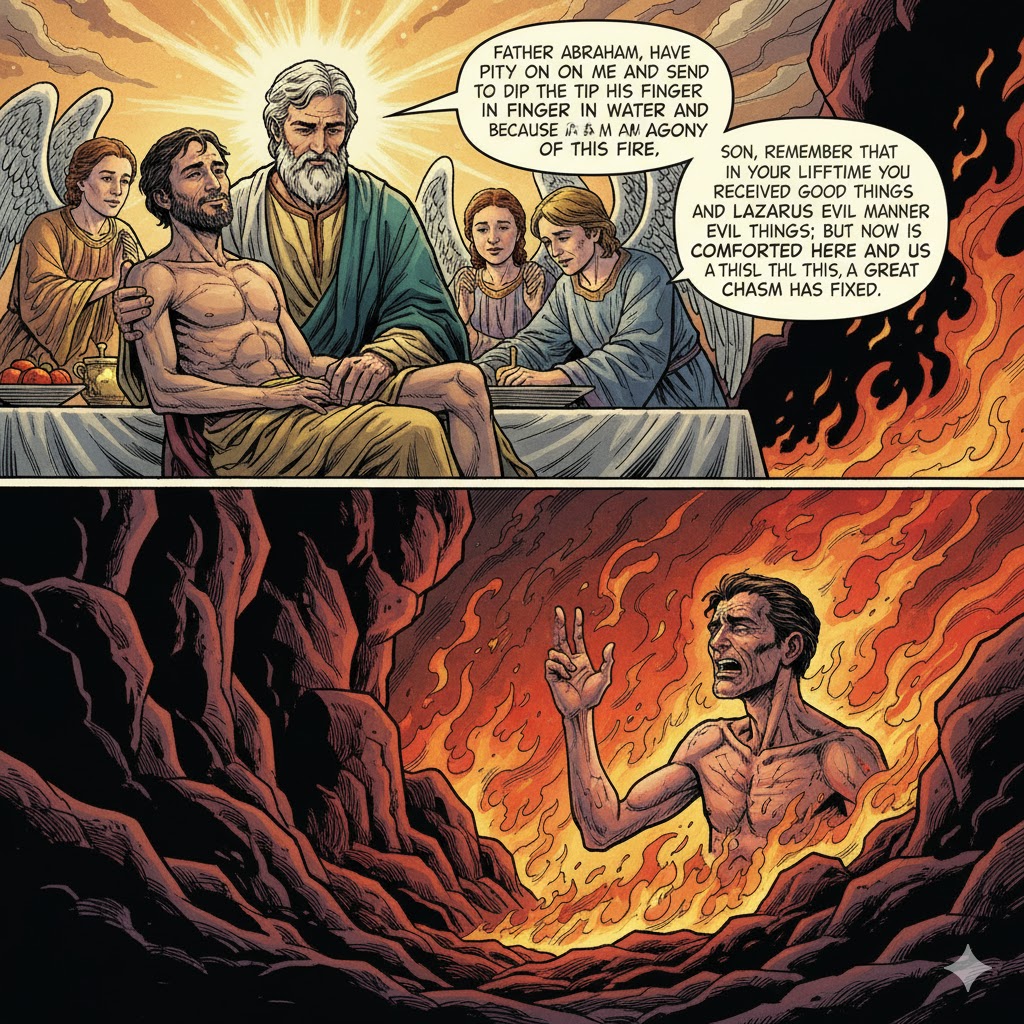
Jesus told the story of Lazarus and the rich man, (Luke 16:20-25), whereby he mentioned that the rich man went to a place of burning torment. While this lengthy parable explains that the rich man is in an extremely bad place, Jesus did not give the details about the exact moment when this rich man crossed the line, and God’s mercy no longer extended to him.
Hell is discussed in many scriptures, and the same words for the eternal nature of heaven, also apply to hell. However, the only scripture where we can see a definitive line drawn concerning that time when God’s mercy has met its end, is Judgment Day. On that day, everyone will be judged, but what all is happening between now and then?
The fact that there are people who have died, and came back to life to tell about their experience of Jesus pulling them out of hell, is an indication to me that there might be a window of opportunity after death, whereby someone might be saved. I won’t be dogmatic about this; I’m simply saying that I think it could be a possibility.
The window of opportunity for salvation after death, if it exists, is probably very limited, and even if it exists, many people still do not cry out to God in that hopeless situation. They are deceived into giving up on God, or judging God and cursing Him, rather than crying out for His mercy. I say this only because Jesus said, paraphrased, that the way to destruction is easy, and many people are destroyed, in contrast to the way to life, which is narrow, and few people find it, (Matthew 7:13-14). This is a choice that people make, and it is because of their continual unrepentant rebellion that they are lost, rather than God’s lack of mercy.
Matthew 7:13-14 [excerpt below from the International Standard Version]
“Go in through the narrow gate. For the gate is wide and the road is spacious that leads to destruction, and many people are entering by it. How narrow is the gate and how constricted is the road that leads to life, and few are the people who find it!”
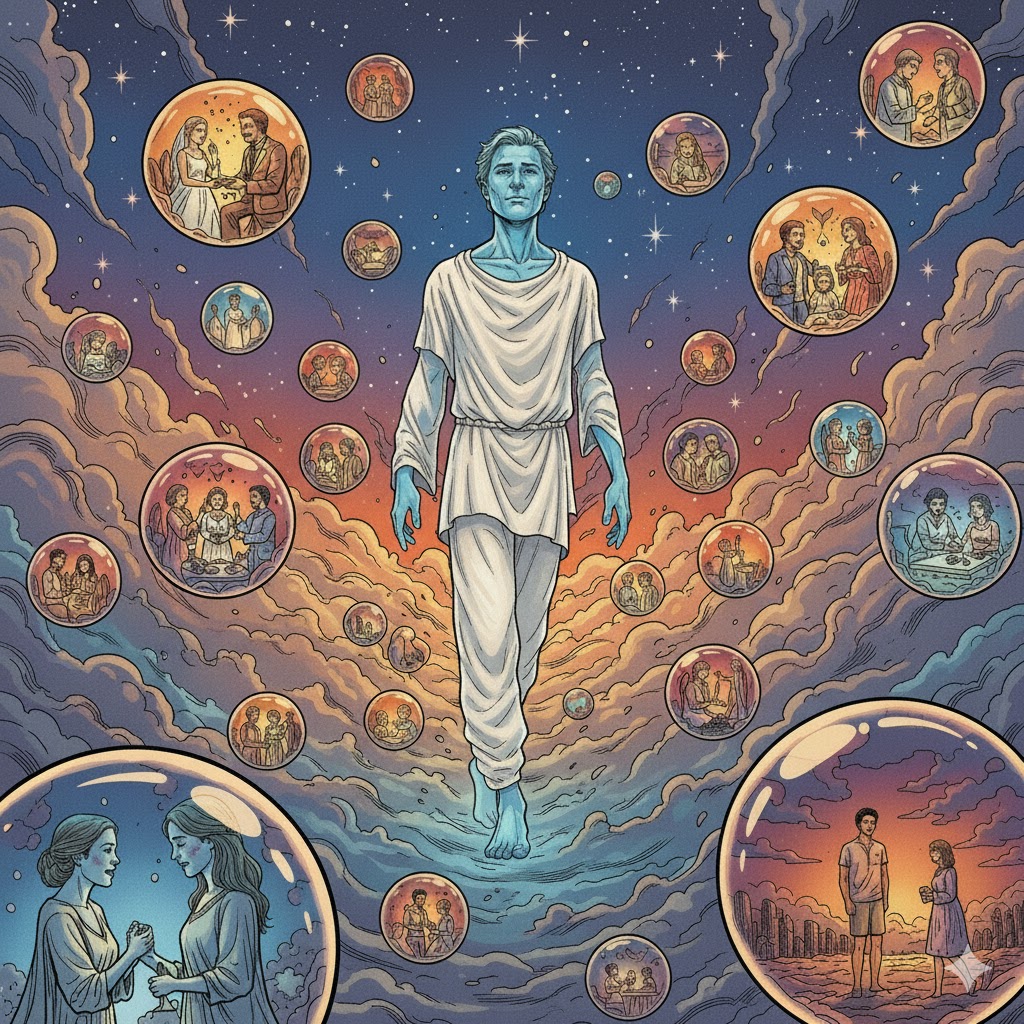
Drawing on my previous New Age studies, I have read in Dr. Robert Monroe’s book, Journey’s out of the Body, something that might corroborate this theory of a window of opportunity for salvation, even after death. This is not to say that the writings of Dr. Robert Monroe should be taken as an authoritative text on par with Scripture; I simply take it as food for thought, coming from a man who might not have been a Christian, but he claimed to travel into spiritual realms outside of his body. I think it’s significant, that Dr. Monroe, who makes no claim to being a Christian, thinks he might have heard Jesus roll by and cull out souls wandering in the astral plane. In a chapter titled, “Cause the Bible Tells Me So,” Dr. Monroe recounts the following, with my bracketed comments added:
“It makes no difference where one is at in Locale II, [one of the locations Dr. Monroe would astral project to], the event is always the same. In the midst of normal activity, whatever it may be, there is a distant Signal, almost like heraldic trumpets. Everyone takes the Signal calmly, and with it, everyone stops speaking or whatever he may be doing. It is the Signal that He is coming through His Kingdom. It is an occurrence to which all are accustomed and to comply; it takes absolute precedence over everything. There are no exceptions. At the Signal, each living thing lies down–my impression is on their backs…with head turned to one side so that one does not see Him as He passes by. The purpose seems to be to form a living road over which He can travel. I have gleaned the idea that occasionally He will select someone from this living bridge, and that person is never seen or heard from again. The purpose of the abdominal exposure is an expression of complete submissiveness…”
“In the several times I have experienced this, I lay down with the others. At the time, the thought of doing otherwise was inconceivable. As He passes, there is a roaring musical sound and a feeling of radiant, irresistible living force of ultimate power that peaks overhead and fades in the distance…After His passing, everyone gets up again and resumes their activities…There is a complete acceptance of the incident as an ordinary part of their lives…Is this God? Or God’s Son? Or His representative?”20
Locale II is an in-between realm, which Dr. Monroe states does not exactly fit with the definition of what the Bible describes as either heaven, or hell. I, however, probably know Scripture better than Dr. Monroe did, and I have come to the conclusion that Local II might actually be Hades/Sheol, which definitely has a bad side, and it at least used to have a good side, referred to as paradise, or Abraham’s Bosom, (Luke 16:22). After Jesus went to the cross, Scripture indicates that He freed the captives of a lower realm, (Ephesians 4:8-10, 1 Peter 3:18-20).
Ephesians 4:8-10 [bold emphasis added]
Wherefore he said, when he ascended up on high, he led captivity captive, and gave gifts unto men. (Now that he ascended, what is it but that he also descended first into the lower parts of the earth? He that descended is the same also that ascended up far above all heavens, that he might fill all things.)
1 Peter 3:18-20 [bold emphasis added]
For Christ also hath once suffered for sins, the just for the unjust, that he might bring us to God, being put to death in the flesh, but quickened by the Spirit: By which also he went and preached unto the spirits in prison;
I heard a sermon before, where the pastor stated that Jesus released the captives in paradise, to go be with the Father, but in the bad part of Hades, He proclaimed victory. However, what is the point of preaching to spirits in prison, or proclaiming victory, if it doesn’t include the possibly of releasing captives? While it makes sense that the captives in Abraham’s Bosom clearly recognized Jesus’ voice as their redeemer, and they were ready and willing to leave with Him, I’m not sure that I follow with the idea that all the spirits in the torment portion of Hades/Sheol automatically rejected Jesus. Perhaps some of them accepted Jesus? Lord knows.
Anyway, back to Locale II; in order to get to this place while astral projecting out of his body, (either willingly, or accidentally, as he claimed often happened to him), Dr. Monroe passed through an area he described as a “gray-black hungry ocean where the slightest motion attracts nibbling and tormenting beings.” He considered this area either the boarder of hell, or something like it. It sounds to me more like the bottomless pit. Whatever it was, Monroe didn’t want to stick around to investigate, and instead learned a technique to quietly pass through it without incident.
Once past the gray-black ocean, Dr. Monroe entered Locale II, which is a place similar to the “Matrix,” a malleable existence whereby reality takes its framework from the “deepest constant” of the perceiver. The inhabitants there are essentially at the mercy of their innermost thoughts and emotions, which are greatly amplified. Those with negative thoughts and emotions, construct hellish, nightmarish realities in this realm, while those with positive thoughts and emotions construct realities that are almost as nice as what might be considered heaven.
In a manner of thinking, this serves as a kind of divine justice; people experience the sum total of their own innermost beings, and therefore have no one to blame but themselves, for what they experience there.
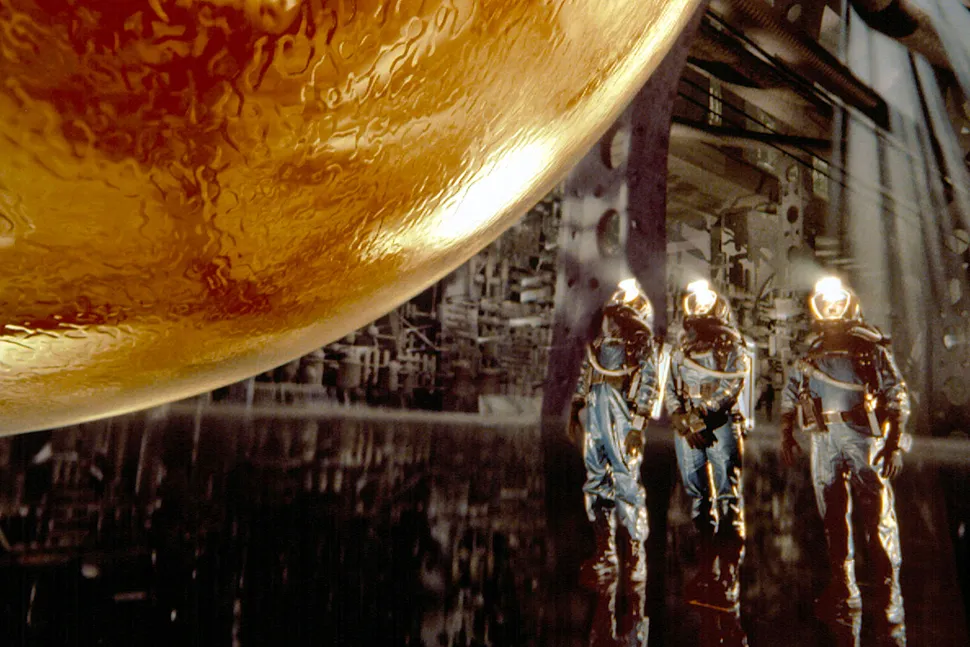
This reminds me of the movie Sphere, which was about an object at the bottom of the ocean that turned this world into a type of “Locale II.” In the end of the movie, after many of the characters were killed because of their uncontrollable fears, the survivors finally realized what this sphere was doing. They all agreed to wish this object away, and off it went into outer space. I personally thought that was a complete and total waste! They did not even try to test the limits of the sphere, and resurrect the people that were killed! For all they knew, they could’ve undone all the damage they caused, and then wished the object away. I guess I’m a bit of an optimist in regards to being able to stay positive with my imagination.
Concerning Dr. Monroe’s experience with the “radiant, irresistible living force of ultimate power,” which he casually stated might have been God, or God’s Son, or God’s representative, I find his account utterly fascinating, for two reasons.
First, Dr. Monroe never claimed to be a Christian. Instead, he consistently maintained a staunch insistence of refusing to openly accept Christ, but at the same time, he provided this very detailed description of someone who he thought might be Jesus, who he encountered while astral projecting. Secondly, I think I know what was happening here.
The place Dr. Monroe was at, was Hades/Sheol, which takes many forms, both good, and bad. Scripture does not state what happened to the good side of Hades/Sheol after Jesus released the spirits there, but it might still be intact. In any case, when people die, if they are not immediately greeted by divine escorts from the highest heaven, (i.e. saved loved ones, like my grandpa Rant greeted my Grandma Thelma, or angels, or Jesus Himself), then they drift down into Hades/Sheol.
If their souls are exceptionally vile and full of contemptible thoughts and emotions, they construct a hellish reality for themselves, which explains why there are variations of hell described from those who have testimonies of going there.
If their souls are full of loving kindness, the realities they construct can be quite pleasant. Then there is that vast ocean of in-between, which again, makes perfect sense. The Bible actually mentions a “lowest hell,” (Deuteronomy 33:22, Psalms 86:13), and because there is a lowest hell, then hell has levels to it. The word in both of these scriptures is Hades/Sheol, (Hades being the Greek word, Sheol being the Hebrew word, and both words referring to an Old Testament place consisting of three parts; a place of torment, a place of paradise, and a deep chasm in between them).
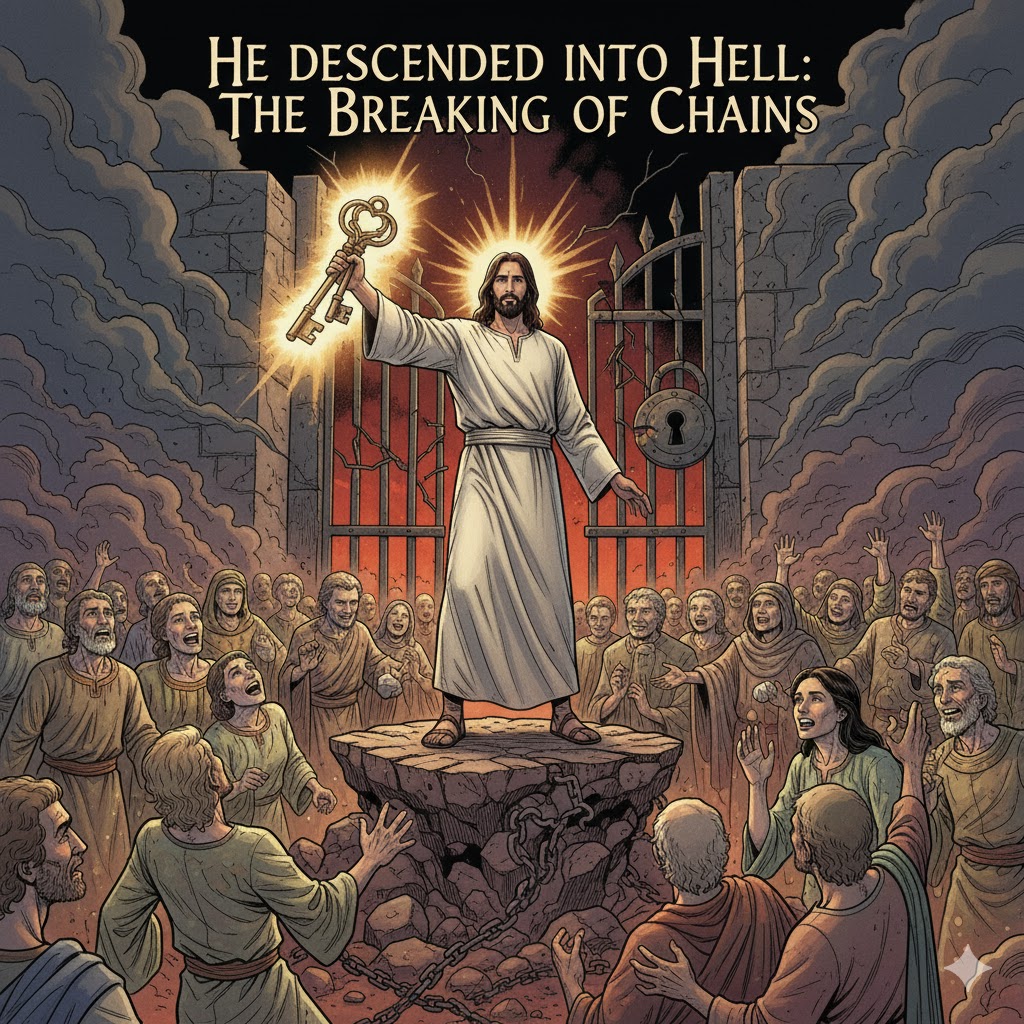
When Jesus died on the cross, He descended into the Earth and conducted a massive purging of many of the souls in Hades/Sheol. After that initial exodus of souls, which He took to the third heaven, it looks to me like He still makes visits down into Hades/Sheol, perhaps traveling all throughout, to both the good and the bad places, searching for those who are ready to accept Him for who He is. He knows their hearts; He picks them out.
It may not happen right away, but eventually everyone comes face to face with Jesus. This is what He is culling these souls out for. They simmer in their own sauce for a while, experiencing the fruit of their inner most thoughts and emotions, and then He pulls them out and addresses them when He sees that they’re ready. Since Judgment Day has not yet come, it could be that there is still time (in this semi-timeless reality), for these departed spirits to repent and turn to Jesus.
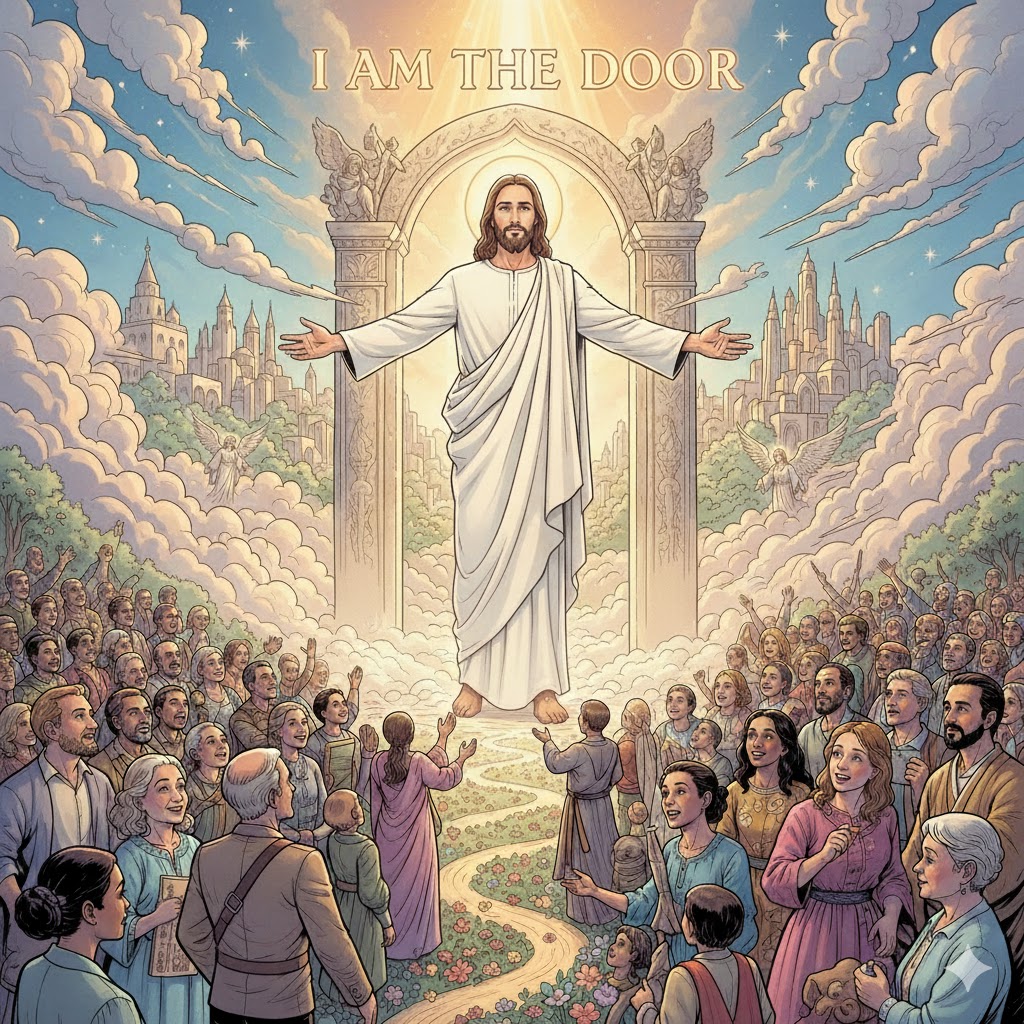
Jesus stands in the door to heaven, serving as the literal door. We can’t enter unless we accept Him for who He is, (John 10:9-10). If Muslims or anyone else, are so hung up on their doctrine that they can look pure love (Jesus) in the eyes, while experiencing that love flowing out of Him, and still not accept Him for who He is, then all I can say is that they must be truly lost beyond the point of salvation. It will have to be true love, and only true love, that can cut through that barrier of religious dogma.
John 10:9-10
I am the door: by me if any man enter in, he shall be saved, and shall go in and out, and find pasture. The thief cometh not, but for to steal, and to kill, and to destroy: I am come that they might have life, and that they might have it more abundantly.
Not all Christians will agree with me on these theological points, perhaps because they are hearing something that I am not saying, but that’s okay. I also suspect that few Muslims would consider the possibility that any Christian, i.e. infidel, will ever make it to heaven. That’s okay too. People are given the God given gift of freewill, to believe whatever they want.
But in the end, Jesus has the last word, regardless of what anyone chooses to believe.

Thank you, read your book too
Awesome, thank you!